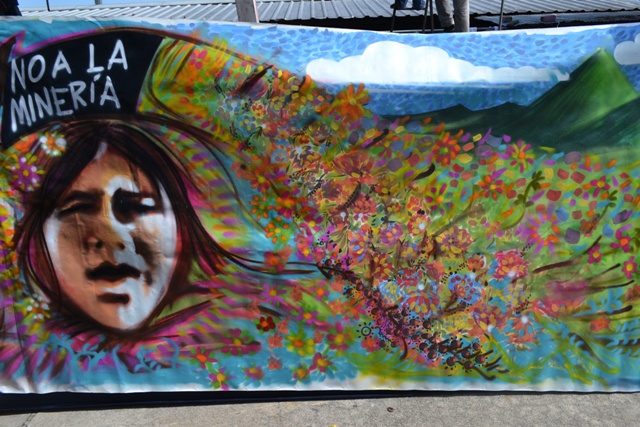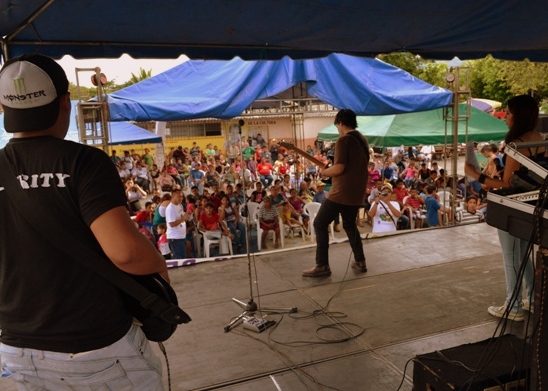ADES and MUFRAS 32 and the communities of Cabañas celebrate the IV Festival for the Human Right to a Healthy Environment
By, Héctor Berrios
On September 15, 2012 women, men, young people and children yet again turned out for the IV Festival for Sovereignty and for “Our Human Right to a Healthy Environment” No to Mining!. This festival, which was first organized in 2006, is a yearly event on September 15 that combines artistic and cultural activities including painting, dance, and special speakers and is held in the plaza in San Isidro. People come from all over the municipalities of San Isidro, Sensuntepeque, Santa Marta, Victoria, Ilobasco as well as from other towns across Cabañas to sing together as one voice for life: The activity is full of Salvadorans who unite to demand life in a healthy environment with peace and justice for everyone.

Since its beginnings, the goal of the Festival for Sovereignty has been to contribute to the resistance that defends life, water and the environment by educating and pulling together as many artists and organizers as possible. The artists take advantage of this space to show their support for human rights through music, song, dance, art, and triggering emotions in defense of the environment.
The festival looks to promote and coordinate participation from different sectors of society in the community, all of whom are concerned about the levels of contamination and environmental deterioration and who demand respect and complete respect for human and environmental rights. Along these lines, the whole population should work to preserve the ecosystem because it is the only guarantee for current and future life. Year after year the Festival for Sovereignty has grown with the support of more people helping to plan, organize and participate in the event.
The Festival begins early in the morning with activities for children, like paintings about the environment and what they think nature is and what we should protect. By using art we are able to educate and impress upon them positive outlooks towards the environment.
These types of cultural and environmental activities need to be constant until we are able to reverse the environmental problems that our country faces. Environmental problems have classified us as one of the countries most vulnerable to natural disasters in the world. Because of our geographic location we are affected by a variety of natural disasters, especially the population located in vulnerable areas. On a world level, El Salvador stands out as having 88.7% of its national territory as a “risk area” and for having the highest percentage of the population at risk.
El Salvador has been put into emergency situations due to the tectonic, volcanic and seismic activity which has brought about the loss of human life and economic setbacks. Also, our environmental reality, which includes deforestation, global warming, demographic growth and water scarcity, has brought us to a critical point that threatens the lives of future and present generations.
We are facing a reality in which we need to organize ourselves to defend life, from every ideology and political party. We have a commitment to resist and struggle against projects that bring death and are promoted with the only goal being to exploit strategic natural resources in our country. Water resources are critical. A number of reports have proven that 97% of the water in our country can be classified as average to poor quality, and only 3% of our water can be classified as average to good quality. This reality forces us to reflect on how we to revert the degradation to our ecosystems. For this reason it is important to educate ourselves to defend water and life, both of which have been threatened by gold and silver mining projects in our municipality.

Gold mining projects have negative social and environmental impacts in communities. Mining companies, like Pacific Rim, operate huge projects that deforest the area and use thousands of liters of water during the leaching process. The water is contaminated with cyanide which later pollutes rivers, water tables, soil and the land where we plant corn, beans and vegetables. This type of industry is a threat to the very life of the community.
Gold mining has negative social impacts on the communities because it promotes divisions among the population. Transnational corporations create conflict and terror that eventually breaks down the social fabric of the community. They do not care about the wellbeing of the population, and instead only care about the economic profits they stand to earn. For this reason they do whatever it takes, including bribery in the communities and the government, as is the case with Pacific Rim. This company has sued the Salvadoran government on the international level in the International Centre for the Settlement of Investment Disputes (ICSID), which is an institution of the World Bank based in Washington. It is demanding $77 million, on top of the procedural costs which would wind up being up to $100 million, and would be paid by all of us for not allowing the company to contaminate our rivers.
The population of the Department of Cabañas, its children, its women and its youth have the right to a future. The organizations promoting this festival and accompanying the people of the region, ADES and MUFRAS-32, invite everyone to join the effort to reverse deforestation and loss of bio-diversity, and to reverse this reality. Economic, social, cultural and environmental rights need to be respected. Specifically, the authorities need to recognize and defend these rights.
We are witnessing an awaking in the social environmental movement, a movement that is willing to struggle and demand, in the first place, the end to neoliberal policies, but to also demand consistency, and more than an official discourse, demand a law that bans metallic mining.
We are sending a message to all of those who have the responsibility as well as the local and national authority to preserve and protect the environment and the rivers of our department from the threats of mining projects and the pollution resulting from large-scale hog farms.
